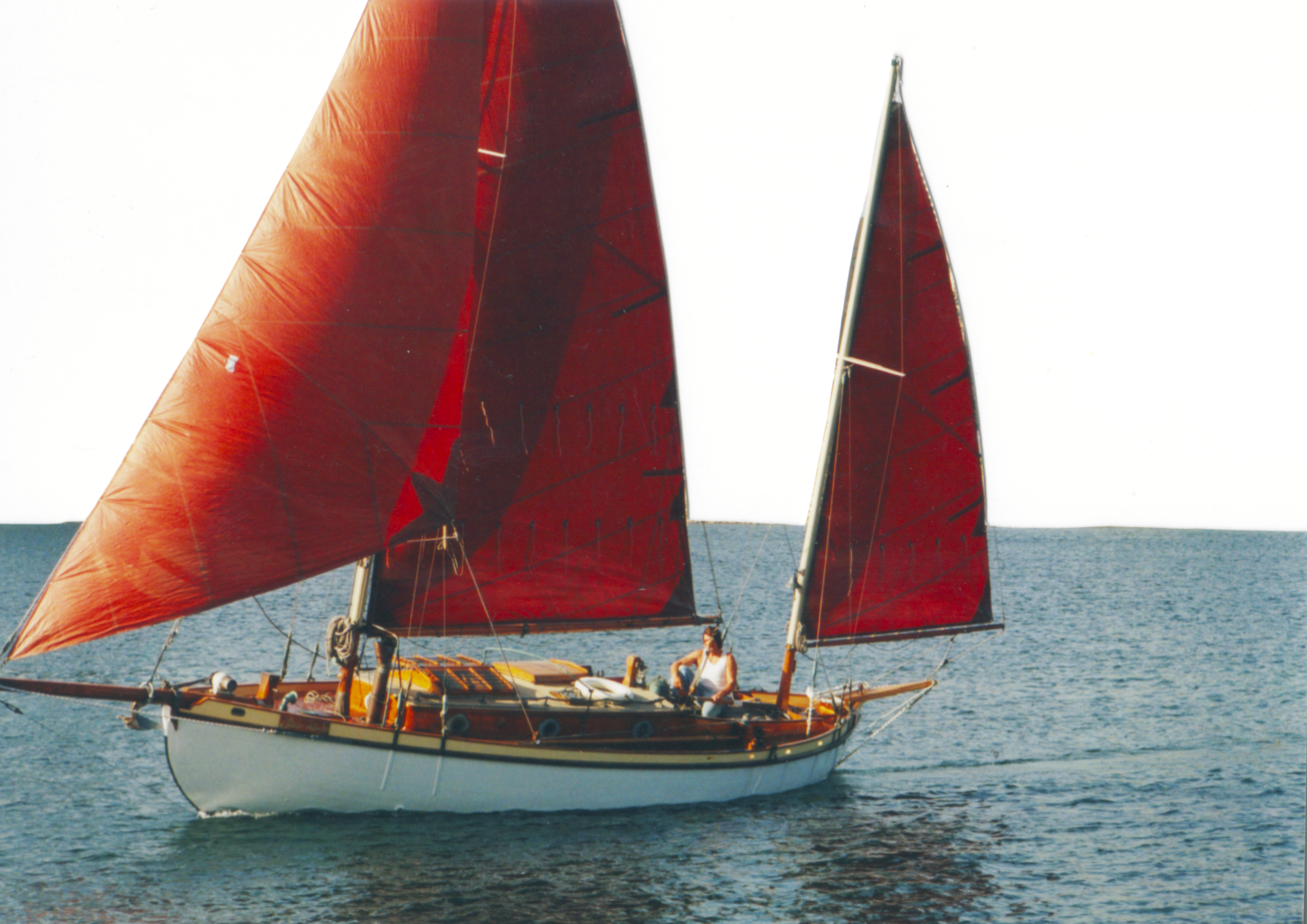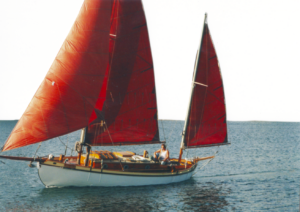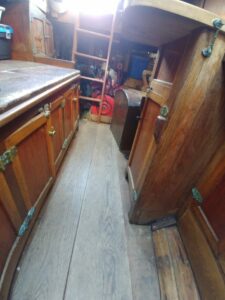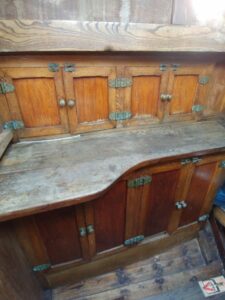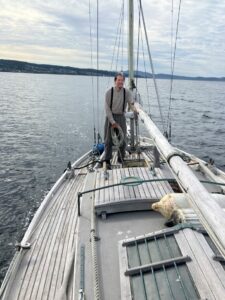As so often happens, someone will contact Pacific Yachting Magazine with a story idea. Musician, teacher and sailing enthusiast Andy Redhead alerted us to the Four Winds, one of the oldest wooden vessels on the B.C. coast.
Andy’s friend Bruce Bott owned Four Winds for fifty years. Bott, a mariner, boatwright, nautical researcher, artist, author and environmentalist, used the sailboat extensively to learn about whales in their natural habitat. In fact, Bott was one of the first mariners to discover orcas in Robson Bight and communicate with them using modern sonic equipment and an almost mystic approach to the whales, Bott and his ‘Project Apex’ crew are credited with being the first ones to create an interspecies ‘orcastra’ sound track coupled with film containing the first underwater footage of free orca. The Film ‘Orca’ premiered at Vancouver’s Queen Elizabeth Theatre in 1973 and helped launch Green Peace’s ‘Save the Whales Campaign.’.
Esteemed Canadian communication theorist Marshall McLuhan commented, “In this particular instance, the use of highly sophisticated audio technology in the analysis and interpretation of the communication of sea mammals is of great interest and value.”
Bott cherished the Four Winds for fifty years and wants her to enjoy another 118 years upon the water, a future she so richly deserves.
“The idea is to keep Four Winds going, for this boat to be in use. Bathed in salt water all these years, her hull does not leak at all. She only needs some cosmetic work, like painting the mast which at my age, I can’t do,” Bott explains. “I want to see that this boat is secure while I am still around,” said the 76-year-old sailor.
After learning her story, I have come to believe it will touch the heart of even the crustiest mariner. It isn’t too far-fetched to consider Four Winds the West Coast equivalent of the Blue Nose, the sailing vessel featured on our dime, the Grand Banks fishing and racing vessel launched on March 26, 1921 in Lunenberg, Nova Scotia.
The Four Winds was built in the Wallace Shipyards on Granville Island in Vancouver. She was an example of the Charles Mower design, and the only boat of her kind ever built and designed in 1905 for Rudder magazine, the first yachting magazine.
Her designer claimed: “Her strong point will be going to windward in rough weather. Always good on the wind, she will be a wonder under bad conditions . . . and if the boat is built according to these plans Four Winds will go through anything, even the rapids of Niagara; she will weather any sea that will ever run, and live it out dry and easy.”
In addition to her good design and solid construction the Four Winds was designed for single-handed sailing. Timber baron James Macrea, her first owner, was so impressed with her that he bought the design outright so that she would be one of a kind. Over time Four Winds proved to be a wonder, even under bad conditions, just as the designer had promised.
In 1905 Vancouver had a new yacht club, and children dressed in Edwardian sailor suits enjoyed watching the beautiful yachts and sailboats like the Four Winds floating offshore. But in the 1930s, disaster hit. Few people could afford to maintain a pleasure boat during the Great Depression. FourWinds was deserted on a mudflat and stripped of her mast. Her keel and copper sheathing were sold for scrap and the spars were used for firewood. During the war years, fuel was rationed, and to survive B.C. yacht clubs formed Naval Auxiliary power squadrons. Although scarred, Four Winds was still sound. At 31 feet in length, she was the right size, could hold 10 persons, and travel non-stop 100 miles, and so during the war she got on the water. When the war ended she changed hands once again and enjoyed a few carefree years. But after her owner died in a tragic dinghy accident, she was hauled out of the water and stored in a Sooke barn.
The barn is where Bott, in 1971, discovered Four Winds, with a flock of chickens nesting in her. After he chased them away he set himself to the task of learning how to be a mariner. He knew nothing about boats and had no tools but soon he found people who would give him tips on restoring a wooden boat. He replaced the plywood interior and attempted to keep the boat in its original condition. Oak, teak and bronze fittings were in character for her, and he fashioned a sturdy knee out of an ancient yew tree. Everything was done by feel instead of by proper design. “But it worked out okay,” Bott says with a smile. “The most important thing for any boat is air flow, not heat. That is the key to keeping an old boat in good shape. There is no rust, mold or mildew in the FourWinds.”
Bott was physically renewed by each challenge he faced, and he and Four Winds faced many challenges together. Like the time he lost hold of the main halyard and he had to climb the mast thirty feet aloft during rough seas. During that same voyage the paper charts flew overboard and he sailed blind until he could see the safe harbour of Hesquiaht light came into view. “The boat rocked gently and the light became hypnotic,” almost as if Four Winds was leading Bott to safety.
He has few modern conveniences in the boat other than a radio, and like the traditional sailor relies on his knowledge of wind, currents and his ancient vessel to experience and enjoy the Pacific waters. He witnessed the everchanging beauty of the ocean, the joy and terror of the water and the sea creatures that call it home.
With Bott at the helm, Four Winds went many years without an engine, only on sail, closer to the wind and the sea. Today she is a joy to behold for dock walkers and mariners alike because she remains virtually unchanged from her original external configuration, a rarity in old sailing vessels. Stepping on board is like stepping back in time. Every part of her from stem to stern has a story attached to it, a living reminder of the kind of wooden ship that plied BC coastal waters over a century ago.
The part of the story that is not known is what will happen next. The last thing Bott wants is for Four Winds to once again be abandoned.
Over the decades, countless mariners have abandoned their boats, both old and not so old, in B.C. waters. The Dead Boat Disposal Society estimates more than 2500 boats have been orphaned and left to decay in marinas, sunk in mud flats, abandoned in the intertidal zone or left to float in the open sea. These unfortunate boats, once a source of fun, pleasure or livelihood for their owners, are being abandoned because their owners don’t want to do the right thing, which is to contact one of two local businesses that offer boat disposal services and ask for a boat disposal estimate. This is an environmental problem of epic proportions.
“There are acres of plastic boats on the coast and nature will have to digest every one of them,” he said.
Bruce Bott is not of their ilk. He has seen it all before having sold his 80 ft Virginia Hope, a fully restored 1929 Mission Smack. (A smack is a traditional fishing boat used off the coast of Britain and the Atlantic coast in the 19th Century.)
His other vintage boat, an 18 ft open ship’s boat built in 1875 also was also fully restored. “l hear that they were both neglected and scuttled needlessly.”
Bott asked Andy to help him save Four Winds from death and destruction. Could Pacific Yachting help? The two friends have envisioned a non-profit association or society, the Friends of FourWinds.
“She is my major asset but I would be open to selling her if someone would look after her. “
Four Winds has earned the right to enjoy her retirement in a world adrift. She can continue to sail on the rolling sea and enjoy the wind in her tall sails and the sound of orcas frolicking beside her.
“Those who dwell into the mysteries and beauties of the earth are never alone or weary of life,” said Rachel Carson (1907-1964), the godmother of the environmental movement. Carson would have felt right at home exploring the B.C. coast aboard the Four Winds.
Four Winds is currently moored in Lund.
For more info on Four Winds visit www.brucebott.com or the Four Winds FB page
